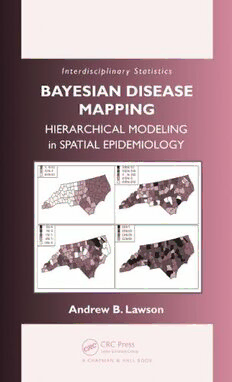
Bayesian Disease Mapping: Hierarchical Modeling in Spatial Epidemiology PDF
363 Pages·2008·10.792 MB·English
Most books are stored in the elastic cloud where traffic is expensive. For this reason, we have a limit on daily download.
Preview Bayesian Disease Mapping: Hierarchical Modeling in Spatial Epidemiology
Description:
Focusing on data commonly found in public health databases and clinical settings, Bayesian Disease Mapping: Hierarchical Modeling in Spatial Epidemiology provides an overview of the main areas of Bayesian hierarchical modeling and its application to the geographical analysis of disease. The book explores a range of topics in Bayesian inference and modeling, including Markov chain Monte Carlo methods, Gibbs sampling, the Metropolis–Hastings algorithm, goodness-of-fit measures, and residual diagnostics. It also focuses on special topics, such as cluster detection; space-time modeling; and multivariate, survival, and longitudinal analyses. The author explains how to apply these methods to disease mapping using numerous real-world data sets pertaining to cancer, asthma, epilepsy, foot and mouth disease, influenza, and other diseases. In the appendices, he shows how R and WinBUGS can be useful tools in data manipulation and simulation. Applying Bayesian methods to the modeling of georeferenced health data, Bayesian Disease Mapping proves that the application of these approaches to biostatistical problems can yield important insights into data.
See more
The list of books you might like
Most books are stored in the elastic cloud where traffic is expensive. For this reason, we have a limit on daily download.
